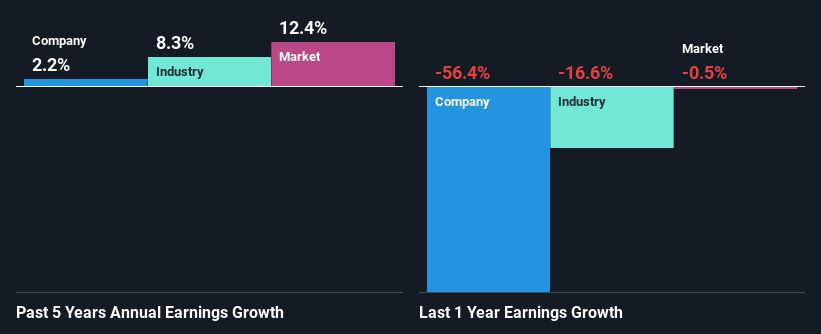Is The Market Rewarding Eurocell plc (LON:ECEL) With A Negative Sentiment As A Result Of Its Mixed Fundamentals?
It is hard to get excited after looking at Eurocell's (LON:ECEL) recent performance, when its stock has declined 13% over the past three months. It seems that the market might have completely ignored the positive aspects of the company's fundamentals and decided to weigh-in more on the negative aspects. Stock prices are usually driven by a company’s financial performance over the long term, and therefore we decided to pay more attention to the company's financial performance. In this article, we decided to focus on Eurocell's ROE.
ROE or return on equity is a useful tool to assess how effectively a company can generate returns on the investment it received from its shareholders. In short, ROE shows the profit each dollar generates with respect to its shareholder investments.
View our latest analysis for Eurocell
How To Calculate Return On Equity?
The formula for ROE is:
Return on Equity = Net Profit (from continuing operations) ÷ Shareholders' Equity
So, based on the above formula, the ROE for Eurocell is:
8.4% = UK£9.6m ÷ UK£114m (Based on the trailing twelve months to December 2023).
The 'return' is the income the business earned over the last year. So, this means that for every £1 of its shareholder's investments, the company generates a profit of £0.08.
What Has ROE Got To Do With Earnings Growth?
We have already established that ROE serves as an efficient profit-generating gauge for a company's future earnings. We now need to evaluate how much profit the company reinvests or "retains" for future growth which then gives us an idea about the growth potential of the company. Assuming all else is equal, companies that have both a higher return on equity and higher profit retention are usually the ones that have a higher growth rate when compared to companies that don't have the same features.
Eurocell's Earnings Growth And 8.4% ROE
On the face of it, Eurocell's ROE is not much to talk about. However, given that the company's ROE is similar to the average industry ROE of 8.1%, we may spare it some thought. On the other hand, Eurocell reported a fairly low 2.2% net income growth over the past five years. Remember, the company's ROE is not particularly great to begin with. So this could also be one of the reasons behind the company's low growth in earnings.
We then compared Eurocell's net income growth with the industry and found that the company's growth figure is lower than the average industry growth rate of 8.3% in the same 5-year period, which is a bit concerning.
Earnings growth is an important metric to consider when valuing a stock. It’s important for an investor to know whether the market has priced in the company's expected earnings growth (or decline). Doing so will help them establish if the stock's future looks promising or ominous. One good indicator of expected earnings growth is the P/E ratio which determines the price the market is willing to pay for a stock based on its earnings prospects. So, you may want to check if Eurocell is trading on a high P/E or a low P/E, relative to its industry.
Is Eurocell Making Efficient Use Of Its Profits?
While Eurocell has a decent three-year median payout ratio of 48% (or a retention ratio of 52%), it has seen very little growth in earnings. So there might be other factors at play here which could potentially be hampering growth. For example, the business has faced some headwinds.
Moreover, Eurocell has been paying dividends for nine years, which is a considerable amount of time, suggesting that management must have perceived that the shareholders prefer dividends over earnings growth. Our latest analyst data shows that the future payout ratio of the company over the next three years is expected to be approximately 50%.
Summary
On the whole, we feel that the performance shown by Eurocell can be open to many interpretations. While the company does have a high rate of reinvestment, the low ROE means that all that reinvestment is not reaping any benefit to its investors, and moreover, its having a negative impact on the earnings growth. Having said that, looking at the current analyst estimates, we found that the company's earnings are expected to gain momentum. To know more about the company's future earnings growth forecasts take a look at this free report on analyst forecasts for the company to find out more.
Have feedback on this article? Concerned about the content? Get in touch with us directly. Alternatively, email editorial-team (at) simplywallst.com.
This article by Simply Wall St is general in nature. We provide commentary based on historical data and analyst forecasts only using an unbiased methodology and our articles are not intended to be financial advice. It does not constitute a recommendation to buy or sell any stock, and does not take account of your objectives, or your financial situation. We aim to bring you long-term focused analysis driven by fundamental data. Note that our analysis may not factor in the latest price-sensitive company announcements or qualitative material. Simply Wall St has no position in any stocks mentioned.

